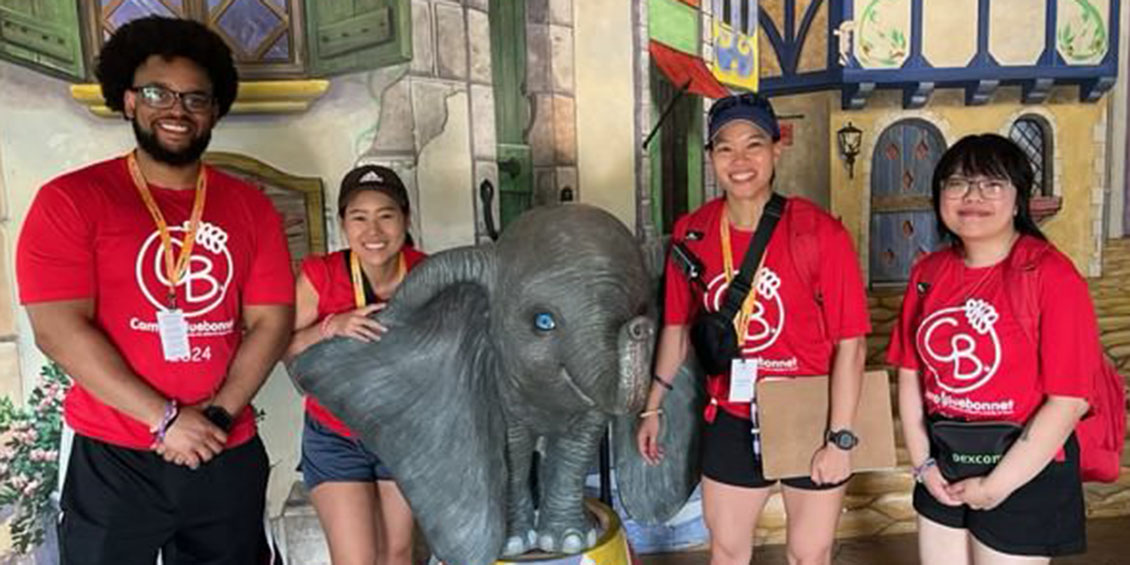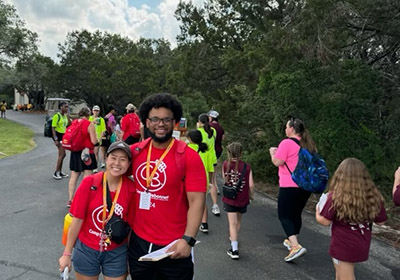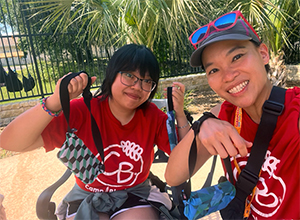
Smarties, Smiles and Insulin Pumps
UHCOP Students, Faculty Serve on Volunteer Medical Team at Camp for Children with Diabetes
At Camp Bluebonnet in Killeen, Texas, children from 1st to 12th grade with diabetes find a safe space to connect, learn, and simply enjoy being young. Along with camp counselors and other staff, a team of on-site health care professionals helps ensure that the children can focus on fun, personal growth and activities such as art and sports, instead of their medication/insulin regimens or blood sugar levels.
To help make the weeklong camp safe and successful, two faculty members and two fourth-year pharmacy students – Sandy Diec, Pharm.D., and Jodie Gee, Pharm.D., BCACP, CDCES, and Quynh Nguyen and Bryant Flowers – from the University of Houston College of Pharmacy signed up to serve on Camp Bluebonnet's June 2024 medical team.
The camp is run by Peaceable Kingdom by Variety (PK), a nearly 40-year-old, Austin-based nonprofit organization. The goal of the camp is to show children that there are others who face similar challenges, as well as for parents and caregivers to exchange experiences about the realities of living in a family affected by diabetes. But most importantly, it's a place where children can have a good time and be safe.
Through hands-on-experience, the volunteers not only assisted with diabetes management but also gained a deeper understanding of the daily challenges children with this condition face.
Diec said she didn't hesitate to join Gee.
"I've had experience with diabetes camp before when I was a pharmacy student and, at that time, I didn't know what I was walking into, but I really enjoyed my experience," Diec said. "Ever since, that has solidified in me the pursuit of ambulatory care as a profession."
Peds Perspectives
Both Diec and Gee took this opportunity to learn and teach their students how to help the diabetes community.
"I don't get the opportunity to work with children because my primary practice is in adults and elders, so this was a very rewarding experience," Diec said. "The conversations I had with children were the most memorable for me, there was a camper who introduced himself to me on the first day. He showed me bracelets he had made during art day and was telling me about the different bracelets he had for every year he had been on camp."
 "At that, point I got the realization that these children really enjoy their experience
because they keep coming back."
"At that, point I got the realization that these children really enjoy their experience
because they keep coming back."
Assigned to 4th grade attendees, Gee said she was impressed by the knowledge of medical terminology demonstrated by her 8-and 9-year-old campers during a game of "Diabetes Jeopardy."
"They had questions on the jeopardy game that we quiz our second-year students in our courses, so to see them answer that so confidently was amazing," Gee said. "On the other hand, 20 minutes later they were running around, going swimming, eating sugar-free snow cones, just being children. It was such a dichotomy."
Another unique aspect of the camp is the flexibility for siblings of the primary campers are allowed to attend as well.
"I think it was amazing to have their siblings at camp as well," Diec said. "They went through the same training and got the same diabetes education; I think this was really important."
Measured Breaks, Levels
During camp, there was a dedicated snack time where everyone had to stop what they were doing and get their blood sugar checked.
"In a typical camp, they probably eat whatever they want, but here they were very methodical," Diec said.
Overseeing the 7th graders, Diec said the older campers were more aware of their condition and whenever they started feeling bad, they would approach one of the medics and ask for snacks. Younger kids, like 4th graders Gee was monitoring, were not as proactive as older kids, so the camp medical team always had to keep an eye on them to monitor their glucose levels.
The parents of the campers would bring food during lunchtime, and they would tell the medics and their children exactly how many carbs were in each item. To be aware of how much insulin would be produced through food intake.
"They have the awareness of what they should be eating and what they shouldn't be eating," Gee said.
The UHCOP volunteers said they hope other students and faculty get to experience the camp.
"I would recommend it because not only will folks learn about diabetes management, but it's eye opening to see children in this environment," Gee said. "We learn about type 1 diabetes in school, but no one, including myself, really understands how it is to live with diabetes, especially as a child. I think it is inspiring to come to this camp."
For both Diec and Gee, it was heartwarming and eye-opening to learn more about the day-to-day of living with diabetes and working with different age groups than what they are accustomed to.
"It's such an out-of-body experience when, as a medic you see them just behave like kids, with their glucose meter beeping and programming their insulin pumps, and we're in the background carrying packs of Smarties, juice and gummies," Diec said.
Living in Vigilance
On rotations, students learn how to counsel patients to manage their medications. But Camp Bluebonnet provided a rare opportunity to observe first-hand the day-to-day life of patients living with chronic diseases.
"When Dr. Gee reached out to me about this opportunity, I thought it would be a once-in-a-lifetime experience as most campers live with type 1 diabetes, a condition that is not as common," Nguyen said. "The learning experience and what I could provide and gain from the campers was my motivation to go."
UHCOP students divided and conquered. One went with Diec and another one with Gee, then switched so they could experience working with both older and younger children.

Their duties included measuring point-of-care fingerstick blood glucose levels during specific times or, as needed per their judgement, recording blood glucose levels and caloric intake, calculating insulin doses, and observing campers for signs of low or high blood sugar.
"The campers blood glucose could go from 300s to 50s within an hour of moderate activity," Nguyen said. "However, the campers were always aware of their condition and would often approach us with the phrase 'I feel low' even before checking their sugar levels. They could transition from feeling unwell to being fully active in a matter of minutes after receiving treatment."
Working with kids for the first time was a unique experience for the students at the camp.
"As someone who was not good at handling children before, I ended up having kids looking up to me and including me in their camp activities," Nguyen said.
Mindset Reset
This experience also changed their understanding of people living with diabetes.
"Before I would imagine people with type 1 diabetes as being frail and having to live with its complications and symptoms daily, but with today's technology children with diabetes can go about their lives like everyone else with only some minor inconveniences," Nguyen said.
The students also got to practice how to explain complex medical information in a way that is accessible and reassuring. They also learned that having the family members well educated on disease and management greatly improves the quality of life of patients.
"Understanding their daily struggles, fears and triumphs helped me in providing more compassionate care," Nguyen said. "It was an incredibly fulfilling and meaningful experience that has me earnestly contemplating returning in the future."
— by Elias Lilienfeld